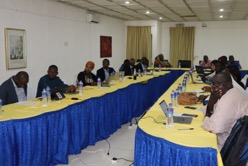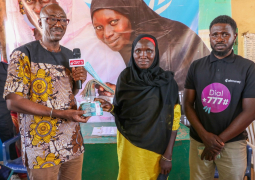
The workshop aimed at providing stakeholders with an overview of the ETLS scheme, create awareness in terms of procedures and application processes as well as discuss some of the challenges faced by enterprises trying to access the regional markets. The workshop also provided a platform for stakeholders to share their experience on trading across the borders and the opportunity for potential ETLS holders to gain first-hand information about the implementation of the scheme.
Omar Badjie, acting director of Industry and Investment, expressed hope that participants would utilise the knowledge gained in their various workplaces.
Aziz Bala-Gaye, principal economist at the Directorate of Industry and Investment at MoTIE stated that the ECOWAS Trade Liberalisation Scheme (ETLS) is the main ECOWAS operational tool for promoting the West Africa region as a Free Trade Area.
According to him, the ETLS is a mechanism for ensuring the free circulation of goods in the ECOWAS region without the payment of customs duties and other charges with equivalent effect on community originating imports.
He informed participants that ETLS came into existence in 1979 and at that time, agreement was reached on only agricultural, artisanal handicrafts and unprocessed products to benefit from the Scheme and it was expanded in 1990 to include industrial products.
The expansion, he added, brought about the need to formulate rules related to the definition of the notion of ECOWAS originating products: called “Rules of Origin”.
On the ECOWAS Certificate of Origin (CO), he said it is a proof of the community origin of the products, adding that the CO is in ISO/A4 format (210 x 297 mm) and green in color. He noted that the CO is a document that must accompany any approved product to certify its community origin.
“Agricultural and livestock products, as well as hand-made products, with or without the aid of tools, instruments or devices operated directly by the manufacturer, are exempted from the CO. The Certificate of Origin is issued by the competent authority of the Member State of origin designated for this purpose and endorsed by the Customs Service of the said State,” Mr. Bala-Gaye informed participants.
The Principal Economist at the Directorate of Industry further spoke on the body responsible for Community origin recognition, which he said is the National Recognition of Community Origin Committee (NRCOC) made up of representatives of the Ministry of Trade, Industry, Regional Integration and Employment; Ministry of Finance and Economic Affairs; The Gambia Revenue Authority - Customs Department; ECOWAS National Unit; The Gambia Chamber of Commerce and Industry; The Gambia Investment and Export Promotion Agency; and The Gambia Immigration Department.
He affirmed that companies wishing to benefit from the community preferential tariff treatment shall complete applications form for recognition of community origin and submit to the National Recognition of Community Origin Committee at MoTIE.
In accordance with a pre-defined periodicity not exceeding thirty (30) days, the Chairman of the National Recognition of Community Origin Committee convenes a meeting of the members for the examination of the applications received and comes up with recommendations. “The company registration number and the identification number of the originating product are issued by the competent authority in accordance with articles 6 and 7 of the regulation,” Mr. Bala-Gaye stated.





